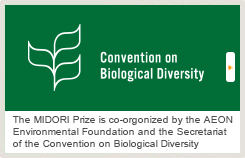The Japan Awards for Biodiversity 2011
*5 Excellence Awards including the Grand Prix were selected for The Japan Awards for Biodiversity 2011.
- Grand Prix
Toward Coexistence with Humans: Protection of Wild Geese as an Index Species of the Wetland Environment
Japanese Association for Wild Geese Protection (Miyagi Prefecture)
 Based on international studies, the Japanese Association for Wild Geese Protection has revealed the migratory flyway of wild geese. The results were compiled as "The Inventory of Wild Geese Habitats in Japan." Also, the Association implemented activities for conservation and enlightenment, and made a proposal concerning the conservation of wild geese. Recently, the Association has taken particular note of rice paddies as habitats for wild geese, and is working to promote and disseminate the "fuyumizu-tambo" method, in the interest of coexistence with agriculture, based on habitat restoration and biodiversity. The Association also has made significant contributions to the listing of "Kabukurinuma and its surrounding rice paddies" as a Ramsar site focusing on rice paddies, and realized X. 31 "Enhancing biodiversity in rice paddies as wetland systems" at CBD COP10 Nagoya.
Based on international studies, the Japanese Association for Wild Geese Protection has revealed the migratory flyway of wild geese. The results were compiled as "The Inventory of Wild Geese Habitats in Japan." Also, the Association implemented activities for conservation and enlightenment, and made a proposal concerning the conservation of wild geese. Recently, the Association has taken particular note of rice paddies as habitats for wild geese, and is working to promote and disseminate the "fuyumizu-tambo" method, in the interest of coexistence with agriculture, based on habitat restoration and biodiversity. The Association also has made significant contributions to the listing of "Kabukurinuma and its surrounding rice paddies" as a Ramsar site focusing on rice paddies, and realized X. 31 "Enhancing biodiversity in rice paddies as wetland systems" at CBD COP10 Nagoya.
Activity Report : Toward coexistence with humans: protection of wild geese as an index species of the wetland environment - Japanese Association for Wild Geese Protection
From the Conservation of Reed Beds to the Making of Raftered Roofs - Living together with Reed Beds -
-
Kumagai Master Thatchers Co. Ltd. (Miyagi Prefecture)
Kumagai Master Thatchers Co., Ltd. is a group of reed thatching experts. Reeds, the roofing material, are divided into water reeds growing in wetlands called "yoshi" or "ashi" and Miscanthus sinensis growing in fields called "susuki" (Japanese silver grass). There are reed beds along the Kitakami River of Kitakami-cho, Ishinomaki City, Miyagi Prefecture, where Kumagai Master Thatchers is located. The life cycle of reed beds is in the form of semi-natural vegetation. This life cycle can be maintained through human intervention processes such as the cutting, burning and growing of reeds. However, this cycle is no longer generally maintained. Also, the habitats for various kinds of plants and animals provided by reed beds are in danger. Kumagai Master Thatchers has made contributions in order to realize sustainable relationship between nature and humans through conserving reed beds, fostering reed thatchers and developing projects.
Conservation and Management of Asiatic Black Bears
NPO Picchio (Nagano Prefecture)
Picchio, a Japanese NPO, has made efforts for conservation and management of Asiatic black bears in Karuizawa, Nagano Prefecture, since 1998. In order to save black bears, precious wildlife, while securing human safety, Picchio has conducted "population management" using radio devices, turned bears back to the mountains using "bear dogs," and has developed garbage containers from which bears cannot easily scavenge. Through these activities, the damage done by bears was greatly reduced. In addition, Picchio has supported environmental education programs and eco-tourism in Japan.
Activities for Nature Conservation and Education in the Source for the Tama River in Kosugemura Village, Yamanashi Prefecture
NPO Tama Genryu Kosuge (Yamanashi Prefecture)
In Kosugemura Village, Yamanashi Prefecture, Tokyo University of Agriculture, Genryudaigaku, and Tama Genryu Kosuge have conducted an experience learning project as an educational activity in the field of nature preservation/conservation. Through these activities students learn about life around this source of the Tama River, such as the natural environment, the local culture and farm work. By acquiring knowledge and technologies handed down in the area, local problems and thoughts about the area can pragmatically be studied.
Noda Natural Symbiotic Farm
Noda Natural Symbiotic Farm (Chiba Prefecture)
"Noda Natural Symbiotic Farm" funded by Noda City was founded in 2006. The Farm obtained 32 ha of lands which include large scale yatsuda (wetlands or wet paddies in valley regions). The Farm has been run by placing priority on conserving nature, based on the concept of the "co-existence of farming and nature." In line with this concept, organic rice growing and rice growing under a reduced amount of fertilizer are conducted. The allotment of private farmland for community use (500 allotments) starting in 2009 has been very popular and is oversubscribed.
Organization: AEON Environmental Foundation
Support: Ministry of the Environment, Japan










